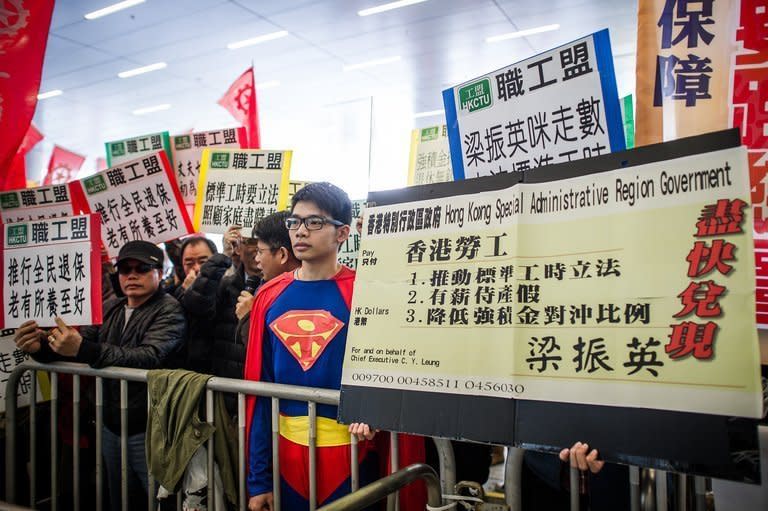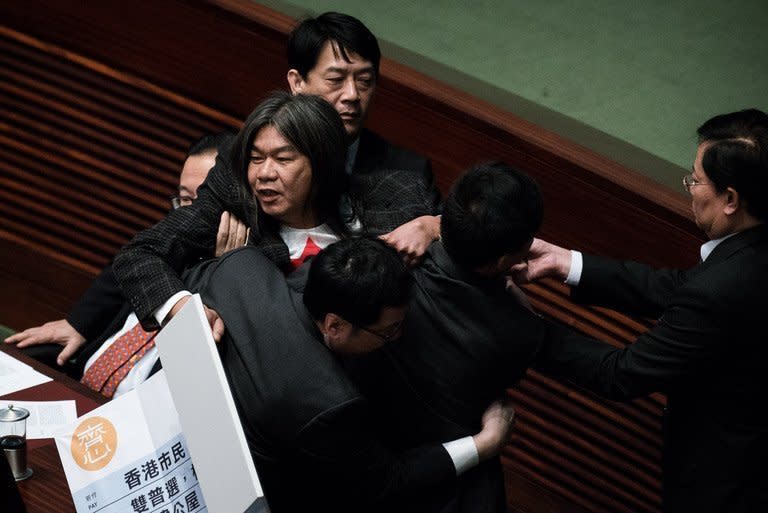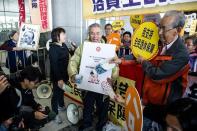Hong Kong leader vows to tackle housing crisis
Hong Kong's Beijing-backed leader Wednesday unveiled a raft of populist policies with an emphasis on tackling the city's housing crisis, as he aimed to hush critics' repeated calls to step down. In a speech widely seen as an attempt to address rising anti-Beijing sentiment and halt mass protests against his leadership, Chief Executive Leung Chun-ying pledged to increase housing supply, reduce choking pollution and tackle poverty. Leung's first address, which sets out the blueprint for the next five years, comes a week after pro-democracy lawmakers failed in an impeachment bid and following large-scale demonstrations pressing for greater democracy. He took office in July after being chosen by a 1,200-member election committee dominated by pro-Beijing elites, amid rising anger over what many perceive to be China's meddling in local affairs. "The top priority of the current term government is to tackle the housing problem," the 58-year-old told lawmakers, following a sharp rise in property prices and an outcry over the cramped living conditions of tens of thousands. "We recognise that problems stemming from property prices and rental, cage homes, cubicle apartments and sub-divided units cannot be solved overnight. "But we must acknowledge these problems, understand the gravity of the situation, and take the first step forward to resolve them," he said. The government, he pledged, would increase land supply to provide around 128,700 new homes "in the short-to medium-term", with a range of measures including the conversion of 13 green belt zones and further land reclamation. On air pollution, which regularly shrouds Hong Kong's iconic skyline in smog and is said to kill around 3,200 city-dwellers annually, Leung said the government would set aside HK$10 billion ($1.3 billion) to phase out old diesel-engined vehicles. New laws to ensure ships berthing at Hong Kong switch to cleaner fuels will also be considered. In other key areas he said a poverty line would be set to try to help the "many people who live a hand-to-mouth existence"; the number of residential care places for the elderly would be increased; and the possibility of free kindergarten places for all children would be examined. A popular ban on pregnant mainland Chinese women visiting the city to give birth so their children can acquire residence would be maintained. Skirting the thorny issue of universal suffrage, demanded by many in the city of seven million, he reiterated the government would "at an appropriate juncture" launch a consultation on ways to elect the chief executive in 2017. China -- which regained control of Hong Kong from Britain in 1997 but grants it semi-autonomous status -- has said the chief executive could be directly elected in 2017 at the earliest, with the legislature following by 2020. And a proposed consultation on making discrimination on the basis of sexuality an offence was shelved, with Leung saying society was "deeply divided over the issue". Hong Kong City University political analyst Joseph Cheng described the speech as "a plea to Hong Kong people to give him a chance to do his job". "Hong Kong people have to decide whether he deserves that opportunity or not," he told AFP. The leading Civic Exchange think-tank welcomed Leung's stance on environmental issues, but said the government should set a "reasonable but short deadline" on its plan to phase out polluting vehicles. As he prepared to speak several radical pro-democracy lawmakers were ordered to leave the chamber after chanting: "Leung Chun-ying, step down" and "Down with the communist regime". Leung's approval rating has plunged to a low of 31 percent, according to an opinion poll released by the University of Hong Kong on Tuesday. Demonstrators have seized upon the issue of structures built without planning permission at Leung's home as evidence of his untrustworthiness.











